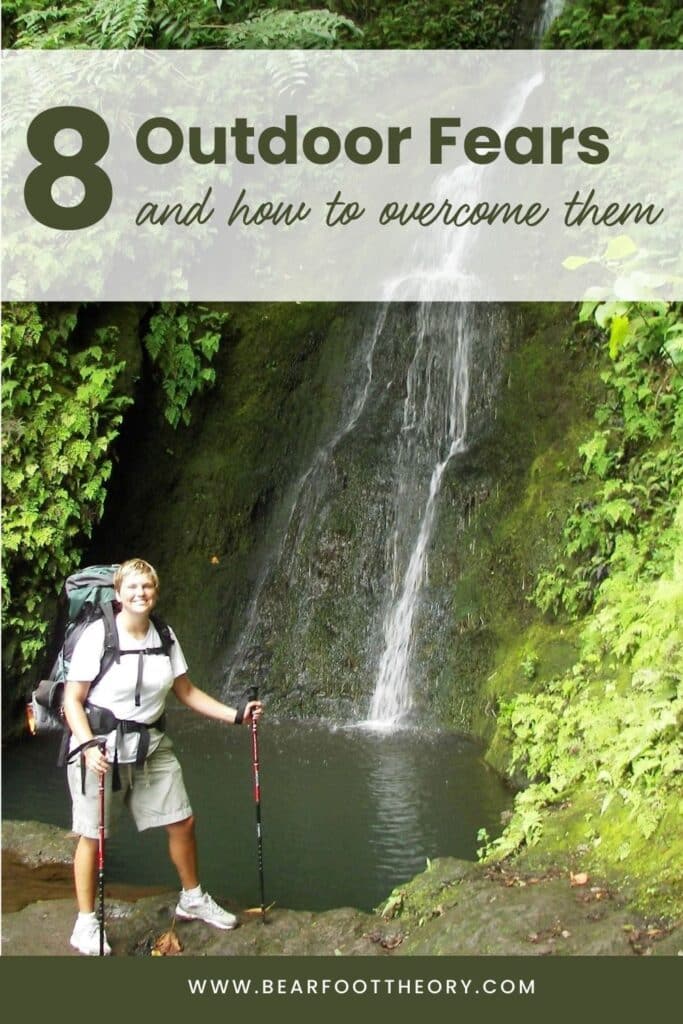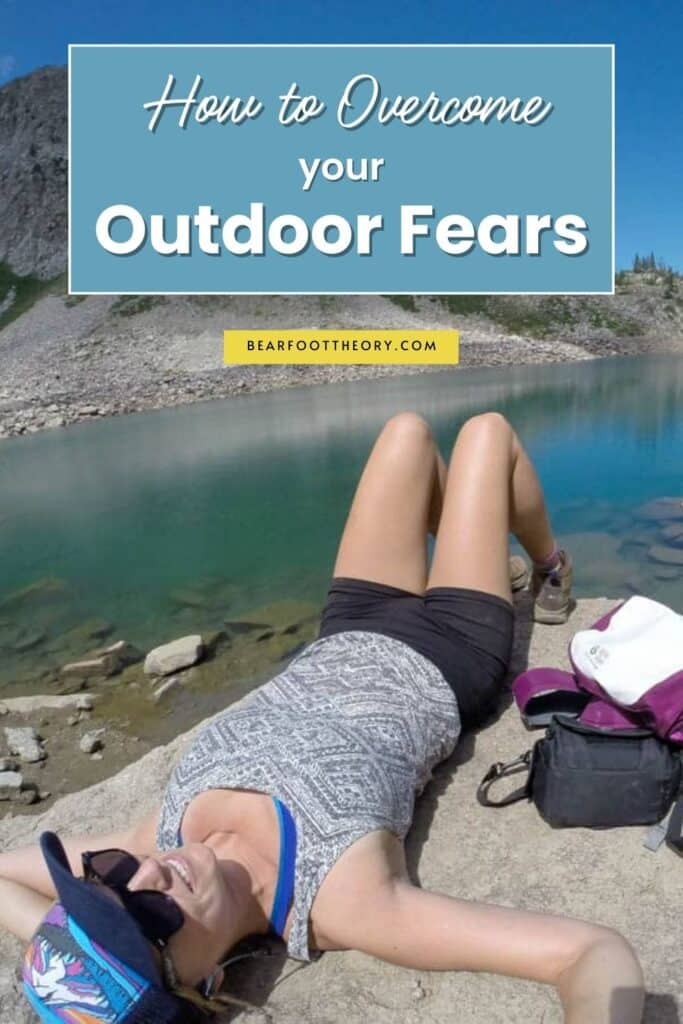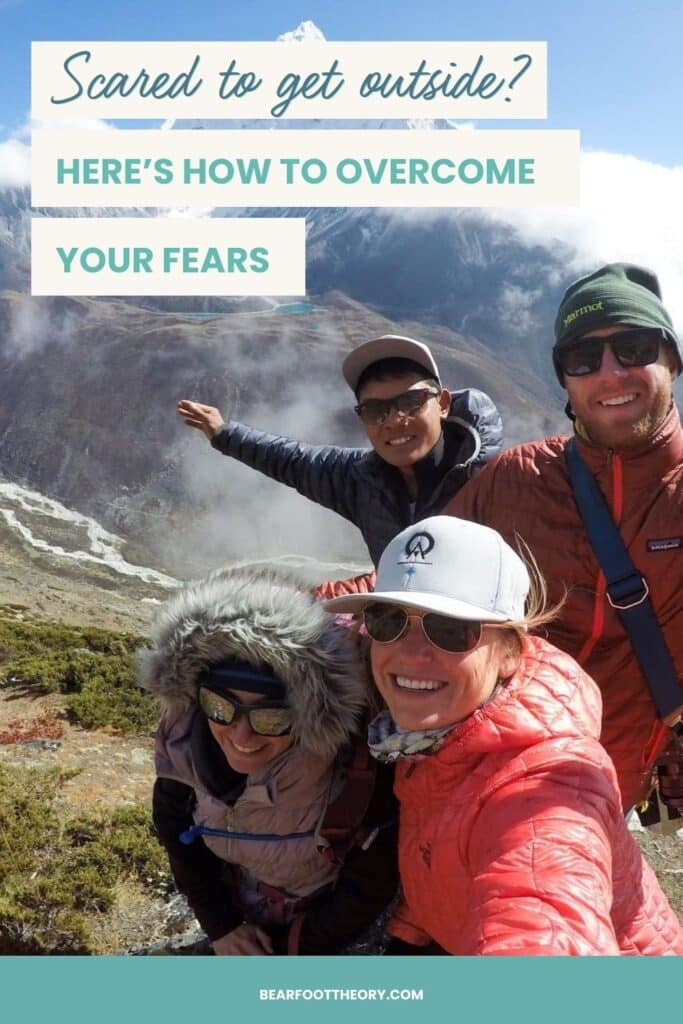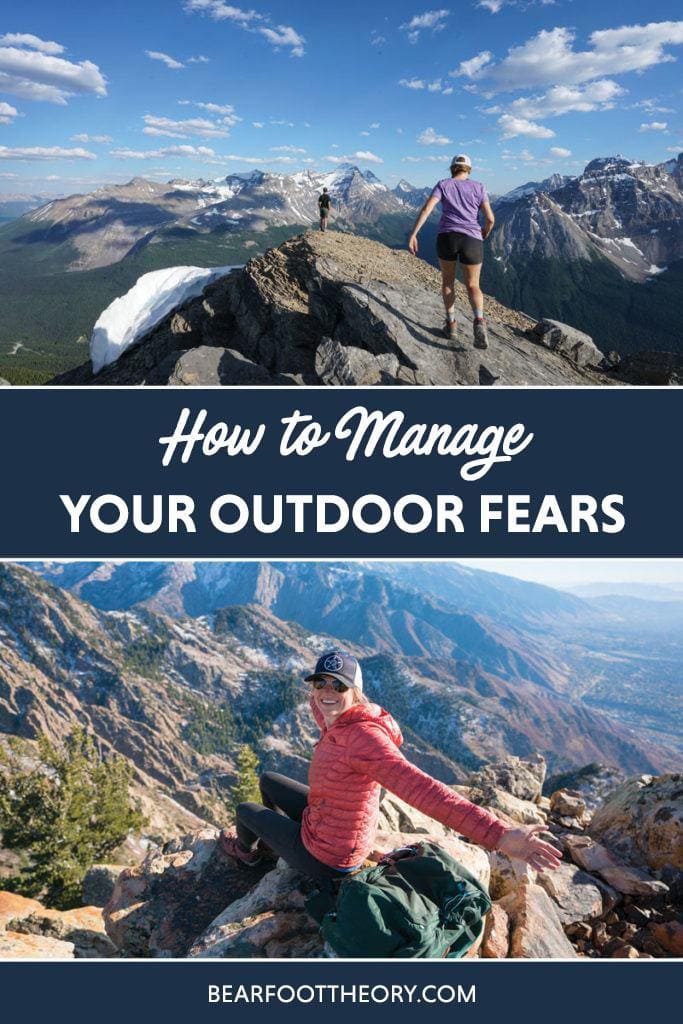8 Most Common Outdoor Fears and How to Overcome Them
Intimidated by the outdoors? I was too when I first started hiking and camping. Learn how to manage 8 of the most common fears when it comes to getting outside.
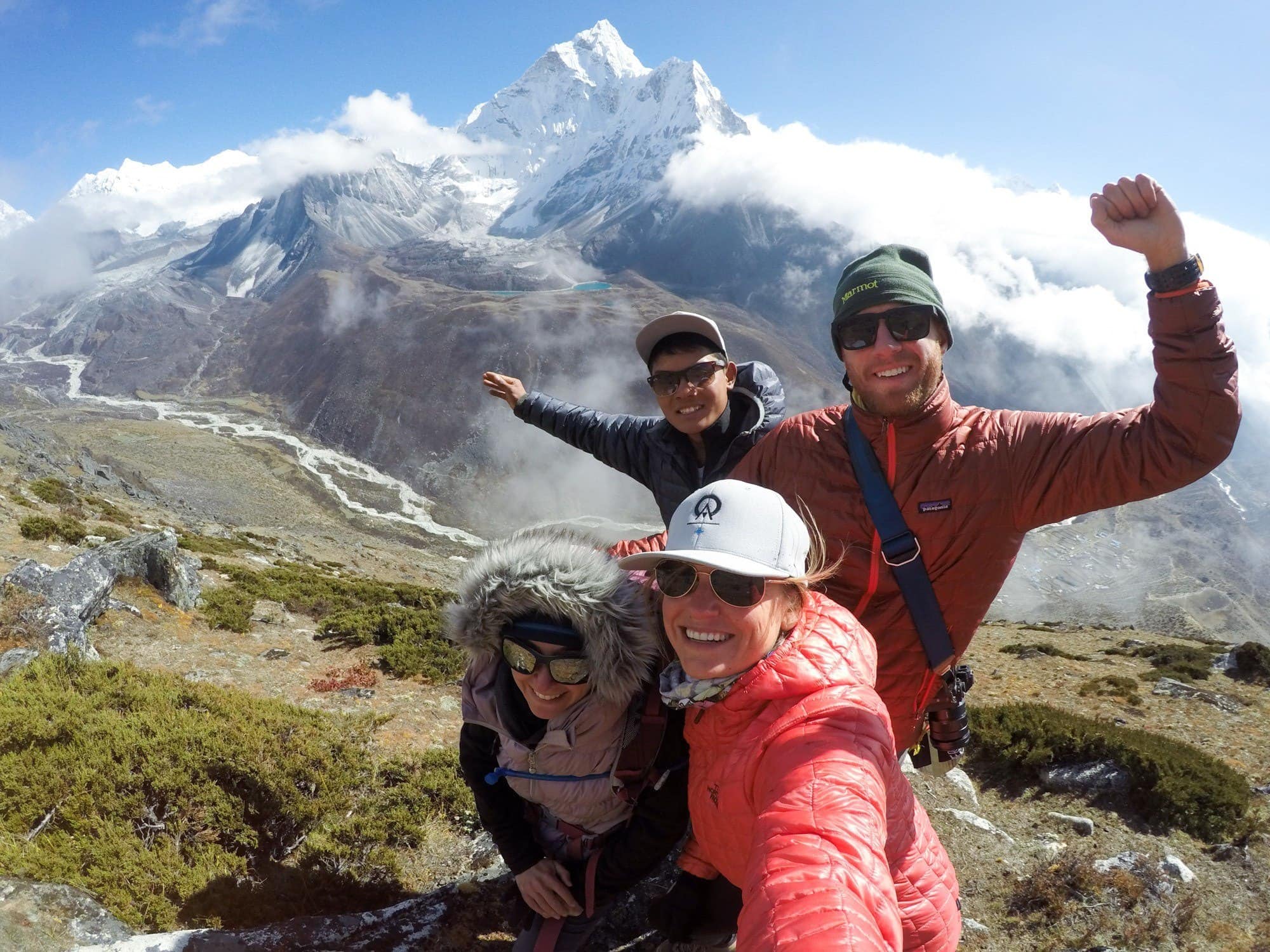
No matter your level of experience, at some point you’ve likely dealt with fear and anxiety on or leading up to an outdoor adventure. Personally, I can be a worrywart, and even when I know my fears are overblown, they can be really paralyzing.
Recently, I was on a 15 mile day hike. The day started out as sunny, so I wore shorts and a t-shirt. Given the length of the trail, I should’ve packed a rain coat, just in case, but I didn’t. Two hours into the hike, dark patchy clouds started to roll in, and I found myself in a near panic. I kept asking myself how could I be so stupid to forget my rain gear (don’t I read my own blog!). Ultimately we decided to keep going and it ended up being fine, except for a quick 30 seconds of hail. With that said, I found it really hard to enjoy myself with all of that nervous energy and thoughts of the worst case scenario.
Had I been prepared with a rain jacket, I wouldn’t have been so worried about the pending storm. Instead I would have had a fabulous day and been proud of myself for crushing those 15 miles, and if it rained, oh well.
I share this because I’m sure that some of you reading this can relate. Maybe you’ve even let your fears about the outdoors keep you inside. Having a few outdoor fears is nothing to be ashamed of, in fact, it’s not just totally normal, it’s healthy! One of the surest ways to find yourself in trouble in the outdoors is ignoring the warning signs and red flags that pop up to help keep us safe.
The trick to managing your outdoor fears and adopting a healthy mindset around them is to know when to hold back and when to push on ahead. Every good experience in the outdoors is a combination of risk-taking and making smart decisions. Sometimes it’s not worth it and sometimes you’ve just got to go for it. Knowing the difference and being prepared for what nature may throw at you is key to safely enjoy your time outside.
To help you do just that, here are some tips for addressing the most common outdoor fears so you can get outside more with less worry.
This post may contain affiliate links.
Fear of Getting Lost
I’ve been lost on two backpacking trips, both pretty early on in my hiking journey. The first time was on my very first backpacking trip near Mount Rainier. We took a left when we should have gone right and ended up camping on a completely different lake than the one we were supposed to be at. We didn’t realize it until the next morning when we were looking at the map to plot out our day.
While it messed up our overall route since we wasted almost a full day hiking in the wrong direction, luckily it wasn’t a big deal. We were on a well-defined trail, so all we had to do was backtrack to find our way back to our car.
The second time I got lost was in Emigrant Wilderness in California. It was early June, and the trail was still covered in deep snow. It was so long ago, I’m not sure we even had a paper map, and we most certainly didn’t have a GPS.
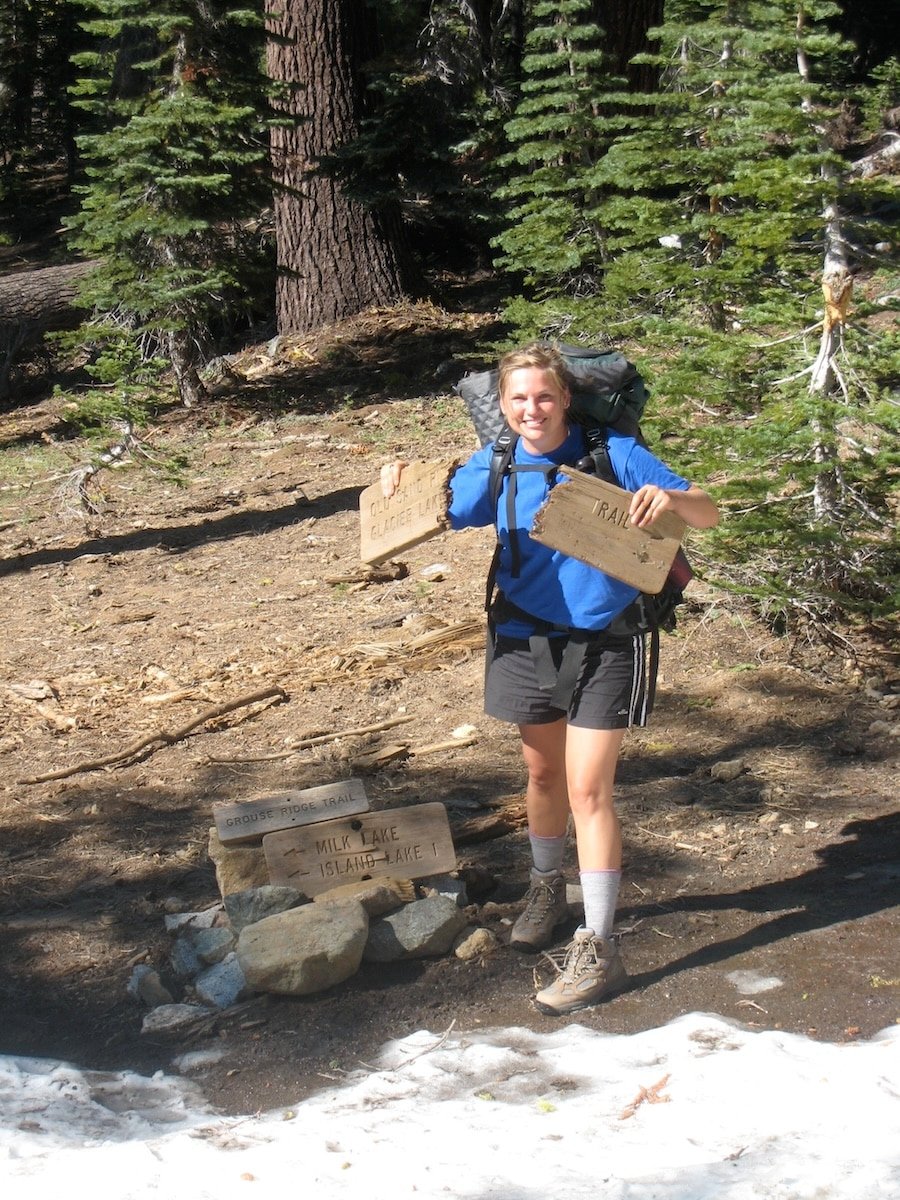
We got way off track and spent a day and a half without any clue where we were. We had no cell service, and on the second day, things started to feel pretty scary as we were eating through our food supply. We decided to hike up to the top of a ridge to see if we could get a better view, and luckily we stumbled right back on the trail.
On those trips, I realized without the proper tools and right preparation, it’s easy to get lost. Perhaps you misread a sign or weren’t paying close enough attention while wrapped up in a good conversation. Maybe it was even the weather that made an area appear slightly different than it has in the past.
The fear of getting lost is real (and getting lost can be dangerous), but with the right preparation, you can avoid getting lost in the first place. To help you overcome your fear of getting lost in the outdoors, check these things off your list before you go out:
Remember, if you do get lost the best way to handle yourself in a scary situation like that is not to panic, stay calm and alert, and be as rational as possible to get back on track.
Save this post!
Enter your email & I'll send this post to your inbox! You'll also receive my weekly newsletter full of helpful advice for planning your adventures.
Fear of Not Being Prepared
If you’re worried about getting caught in a rainstorm (like me) or otherwise being unprepared for whatever your outdoor adventure might throw your way, the best thing you can do is prepare to the extent that you can and then roll with it. We can’t control nature or the weather, and sometimes unforeseen obstacles come up that we have to work around but that’s part of the process of building outdoor skills and adventuring.
It’s always good to be prepared when heading out for an adventure, whether a hike, backpacking trip, bike ride, or paddling trip. Be sure to:
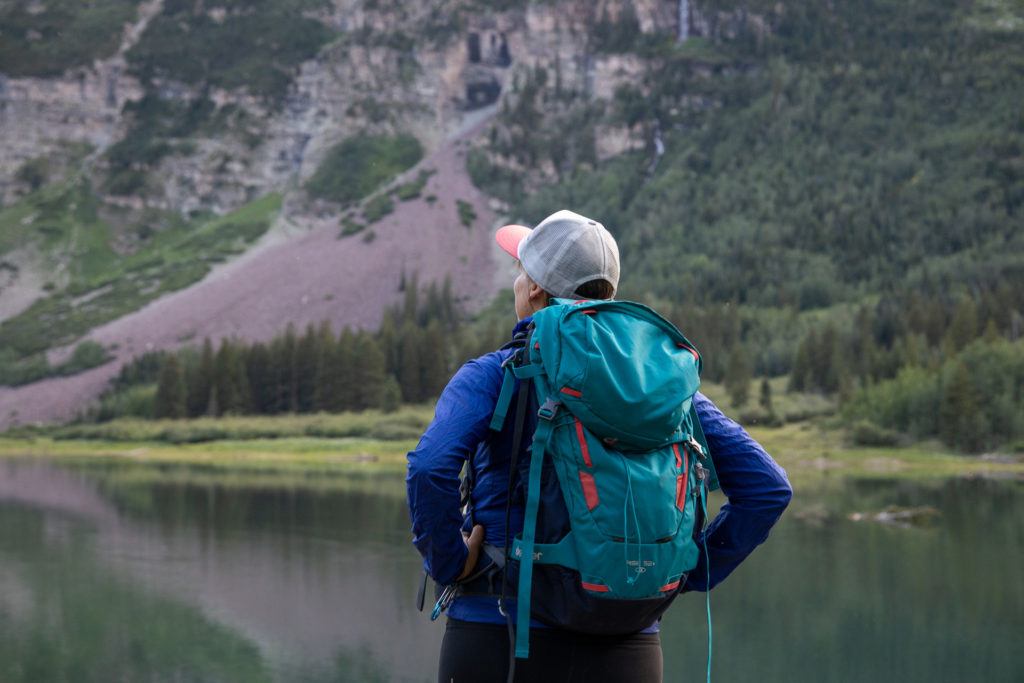
Fear of Being Uncomfortable
The fear of being uncomfortable goes hand in hand with the fear of being unprepared. Do what you can to prepare so you can be as comfortable as possible, then embrace the challenges and any discomfort you encounter from there.
You don’t need to be suffering on account of hiking boots that are too stiff or too small, or from not hiking in the right clothing or bringing proper layers. But outside of that, a little discomfort is a good thing. You might get cold or wet or hot, sweaty, and dusty (or all of the above) but that’s all part of the adventure. If you want to live life to the fullest and have some new experiences, a little discomfort is inevitable.
Plus, growth happens when you get outside of your comfort zone. You may have heard this from fitness trainers or motivational coaches, and it’s true. Here are our tips for preventing and embracing discomfort:
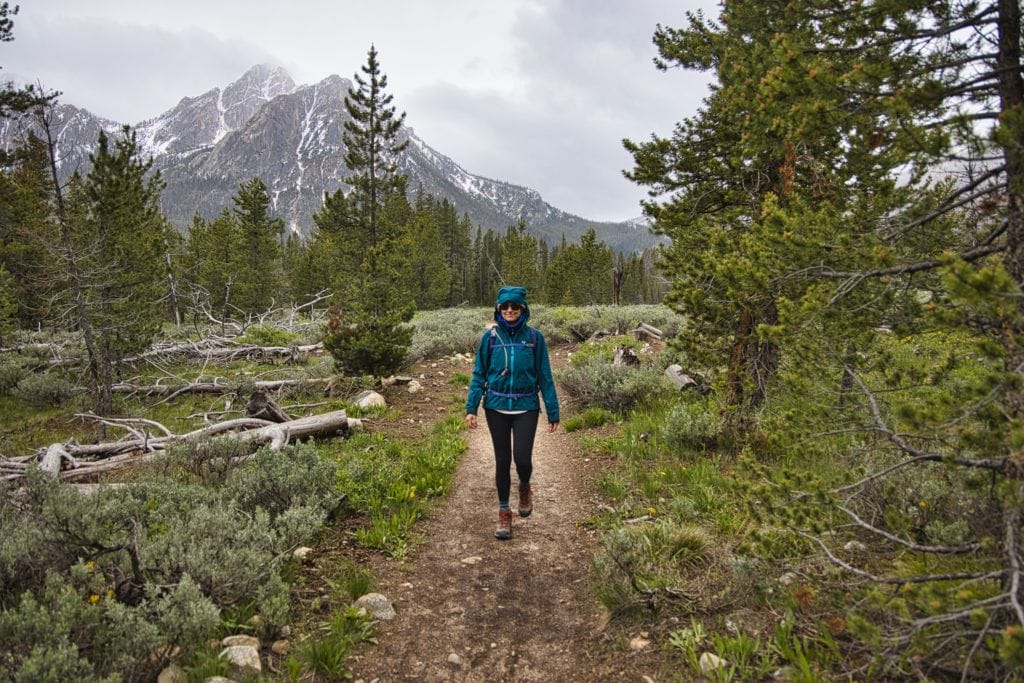
Fear of Insects
But what about the bugs? This is a common outdoor fear that we hear a lot from friends and family that are newer to the outdoors. While flies and mosquitos can be annoying and spiders and scorpions can be a little scary, there are some basic measures you can take to cover up to minimize your risk of being bitten.
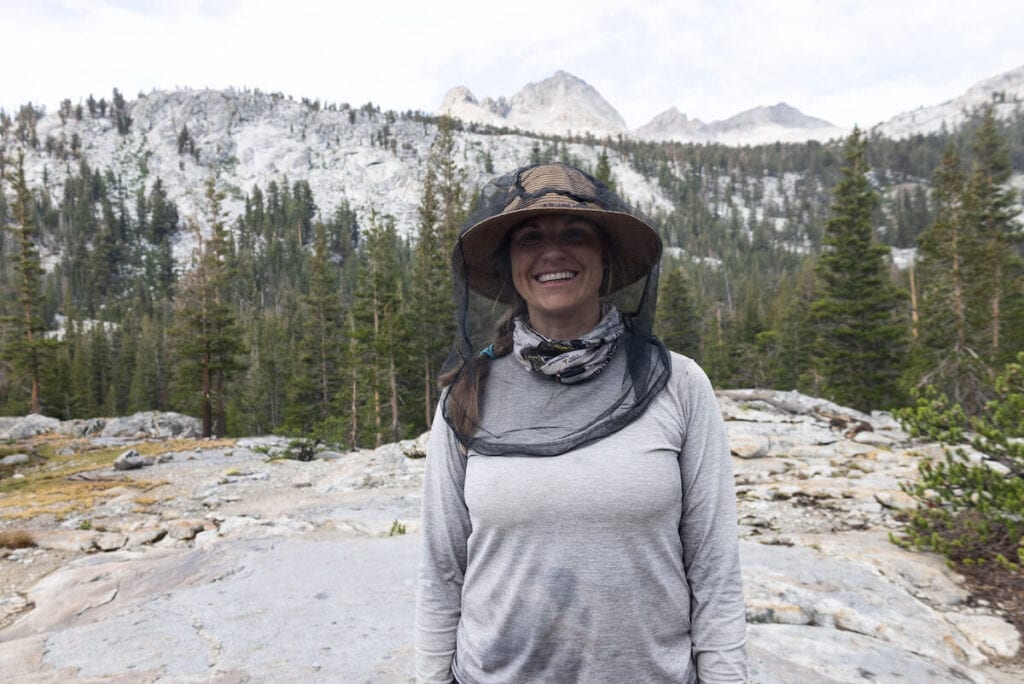
Insects play their own part in the web of nature so it’s best to let them be, not worry too much about them, and take a few basic precautions to avoid unpleasant encounters.
The only bugs that you really should be concerned about (at least in the US) are ticks, since they carry Lyme and other diseases. When Ryan and I were in New Hampshire a few years back, we were in our van one night when I felt a weird bump on my stomach. I immediately looked down and gasped when I saw a tick embedded in my skin.
I’d never been bitten by a tick before, so naturally I freaked out. Ryan ended up digging the tick head out with the end of a nail file since that was the only tool we had on hand. It left a bloody mess all over my stomach and really hurt. I monitored it in the following days for a bullseye, and luckily it didn’t show any signs of infection or disease.
Fear of Being a Beginner
It’s the night before your first-ever mountain biking day trip with friends and you are the only beginner. You’ve gotten into bed early, packed everything up for tomorrow but you worry about not being good enough or holding back the group — in short, you’re not confident that you can pull this off and you’re starting to think you might just cop out and skip the whole thing.
I know because I’ve been there when I biked the White Rim Trail in Canyonlands National Park. I had never been mountain biking before when I got invited on this 4 day biking trip in Utah. Even though I was super nervous, I figured it would be a good chance to learn a new sport.
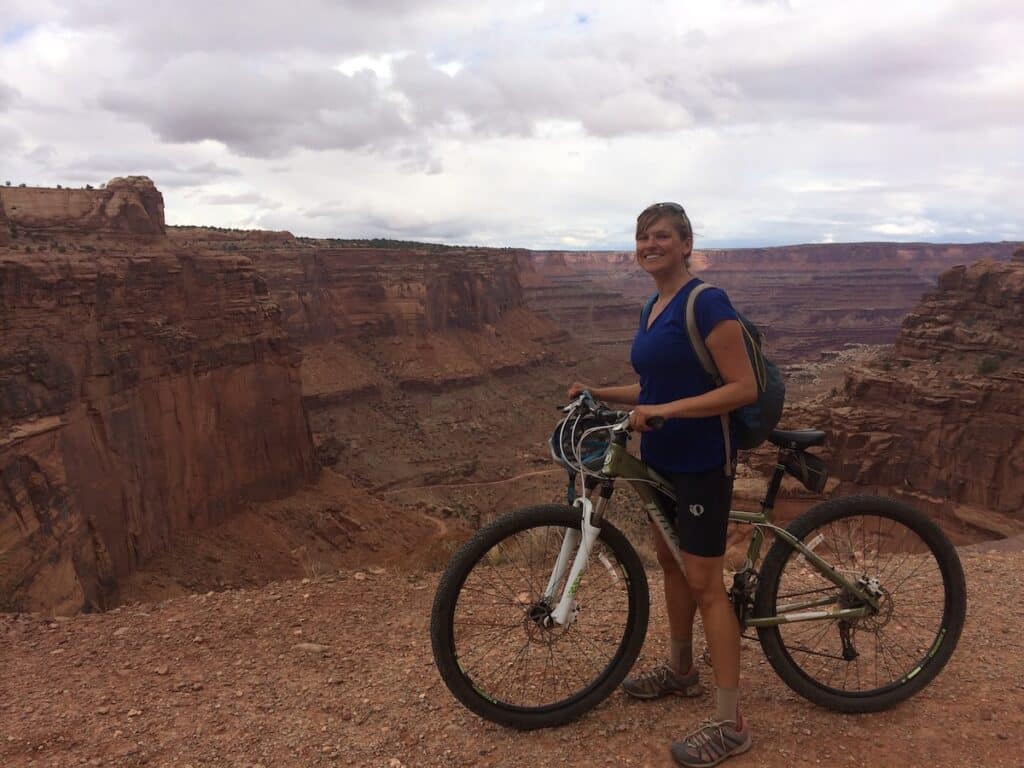
Whether it’s your first time trying a new outdoor activity or you’re getting back out there again, we’ve all heard that voice in our head that makes us think we can’t do something due to our lacking confidence, skills or experience. Yet the best way to gain confidence is just to do it, especially when it comes to being outside, the only way to get better is to get out there!
Here are some tips for channeling your inner confidence on outdoor adventures:
An additional tip I’ll share is to stop apologizing when you’re on your adventures. I mean, stop saying “sorry, I’m slow,” “sorry, I don’t know what I’m doing,” “sorry, I’m not good at this.”
Saying those things only reinforces limiting beliefs. Instead, when talking to your friends, say “thanks for being patient,” “thanks for teaching me the ropes,” “thanks for being supportive.” This turns a negative statement where you are criticizing yourself into a positive statement that compliments your friends for waiting.
Trying a new activity?
Check out all my Outdoor 101 posts for beginner friendly tips to up your outdoor skills in everything from hiking and backpacking to paddling, skiing, and biking.
Fear of Being Out of Shape
Although it may not feel that way, it’s totally fine to feel nervous about being out of shape while doing an outdoor activity. While it’s certainly a personal and much more intimate challenge to face than others, spending time outdoors can not only help you become physically stronger and more healthy, it can also boost your mood and help you to feel more comfortable in your own skin. You can read more about all the physical and mental benefits of hiking and spending time outdoors here.
Back in 2006, I was 30-40 pounds heavier than I am now. I could barely walk up a flight of stairs without getting winded. I felt so embarrassed by how out of shape I was, and I absolutely hated going to the gym. Then I moved to Hawaii and started hiking regularly. Slowly I started to get stronger and feel better, and that’s really how my love for the outdoors blossomed.
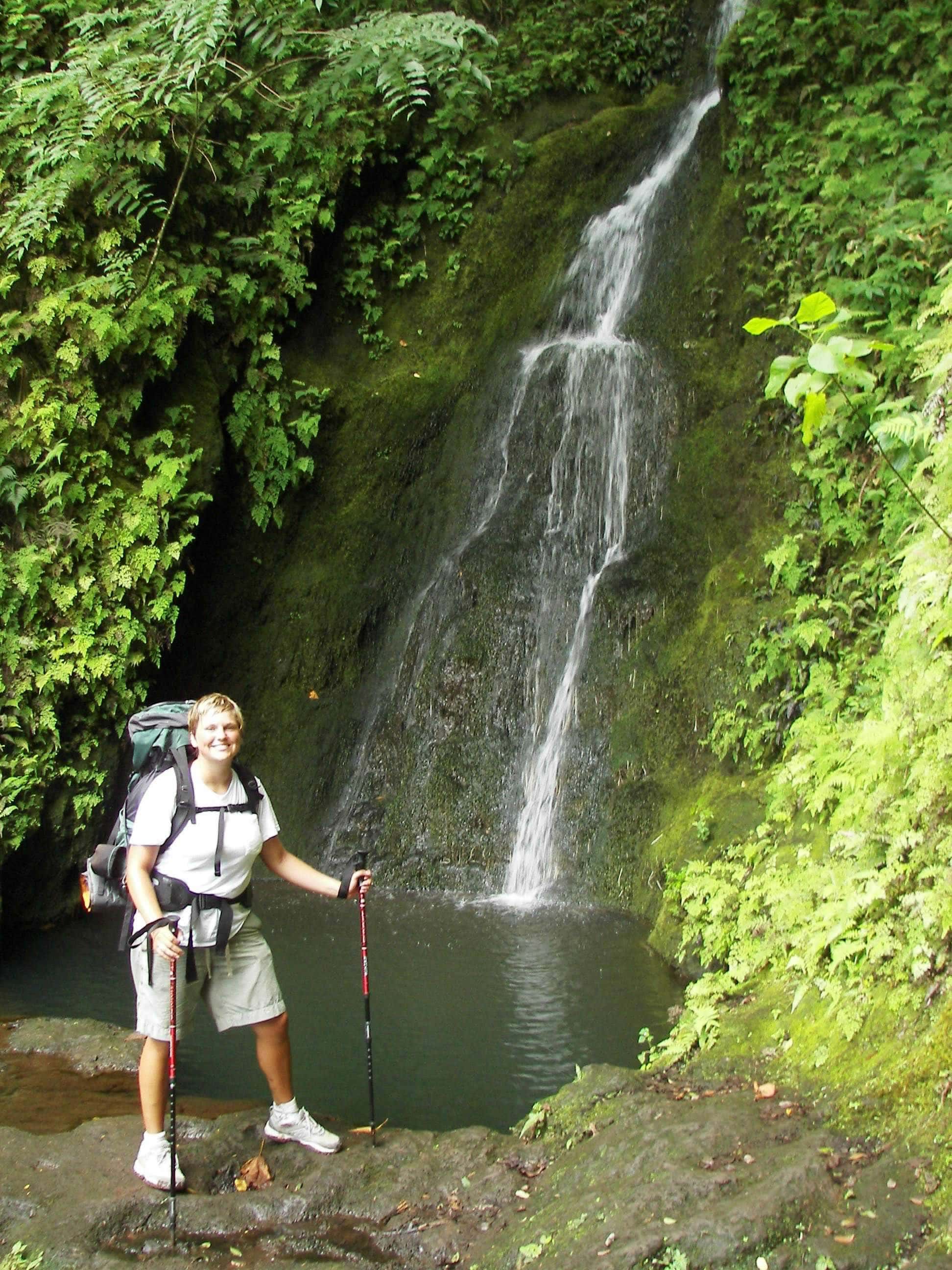
My advice is try not to worry about other people’s opinions, chances are they aren’t even thinking about you! Everyone is their own worst critic, so sometimes taking the first step is the biggest and most difficult one to take, after that things become a little easier. Be kind to yourself and remember that although this might take some time, it’s worth it.
It’s not just an internal battle, there are plenty of external things you can do as well to become more fit and overcome your fear of being too out of shape for the outdoors. As someone who has been there, here’s my advice to you:
Fear of Dangerous Wildlife Encounters
A huge part of being a competent outdoors person is respecting your surroundings and the wildlife that calls those places home. While the animals you may encounter on your hike, bike or trail run may scare you, it’s pretty likely that you scare them even more.
Even though I want to tell you not to worry and wildlife attacks are rare, you never know when you’re going to run into an animal on the trail. So, before you head out, do a little research and look into what sort of wildlife inhabits the area you’re visiting and the best way to avoid them or defend yourself from wildlife if need be. Having the proper knowledge for how to respond can help manager your fears and is the best thing you can do protect yourself.
Also, if you’re in grizzly country, carrying bear spray is critical, and make sure you know how to use it. You should also hike in groups if possible and make lots of noise while you hike to avoid surprising a bear.
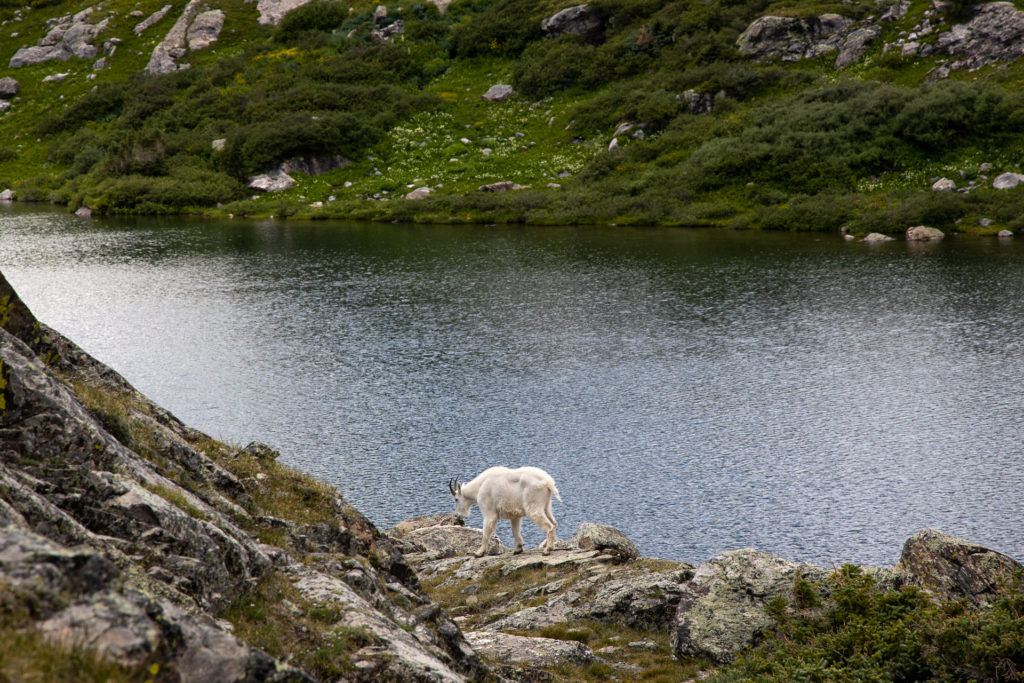
Fear of Hiking Alone as a Woman
Going on a solo hike is something that many women have been discouraged to do by others who, although they mean well, fear for their safety in the outdoors. This stigma surrounds girls of all ages and doesn’t empower them in the outdoors, rather, it keeps them from going outside. While it’s good to acknowledge that the outdoors can be dangerous at times and there can be creeps out there, women are not helpless victims, and it’s important to remember that.
My first big solo hike was back in 2014. I had just gone through a big breakup, and I was living in Las Vegas where I had no friends. I knew that if I waited for someone to go hiking with me, I might be waiting a long time. So I got in my car, drove to Zion National Park, and got a last minute permit for the Subway. I’ll tell you that it was one of the most empowering experiences. I was so proud of myself for going for it, and every single person I met on the trail was friendly and encouraging too!
While feeling scared to solo hike is completely normal, there are plenty of ways to stay safe and be smart while you’re out there. To build confidence and manage your fears about hiking alone, start with these solo hiking safety tips and read my blog post on solo hiking as a woman.
If you’re traveling alone make sure to check out my guide to planning your first solo road trip as well as my solo female van life tips.
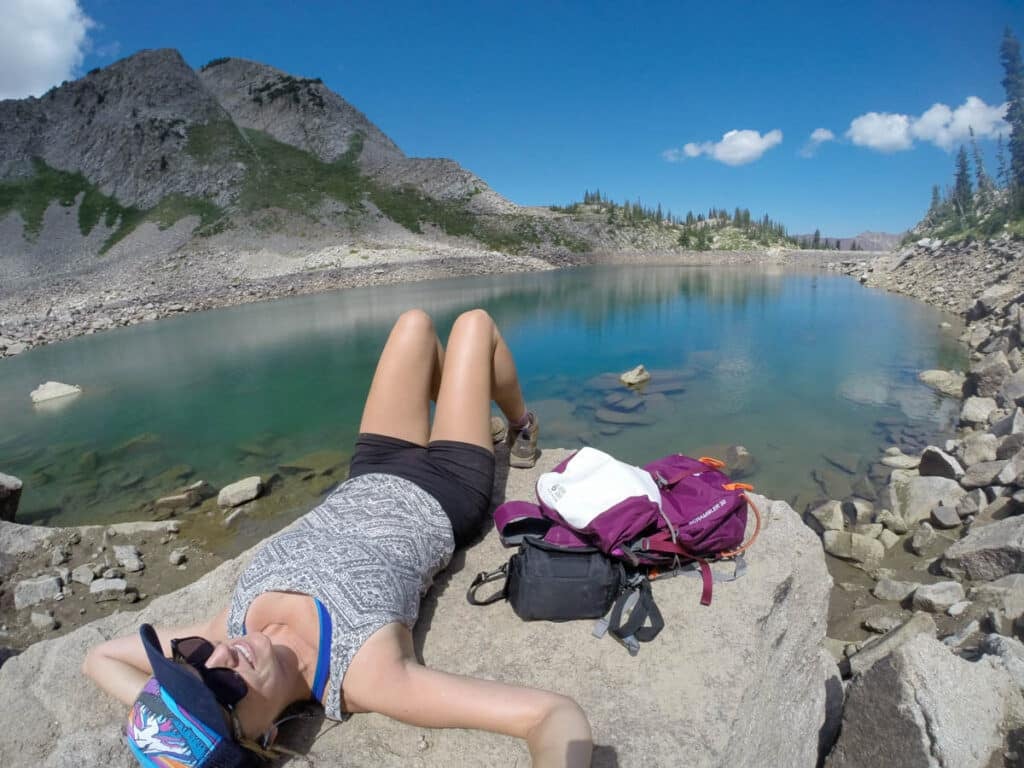
What has helped you build up confidence in the outdoors? How do you currently overcome outdoor fears? Share your tips, advice, and experience in the comments below!

